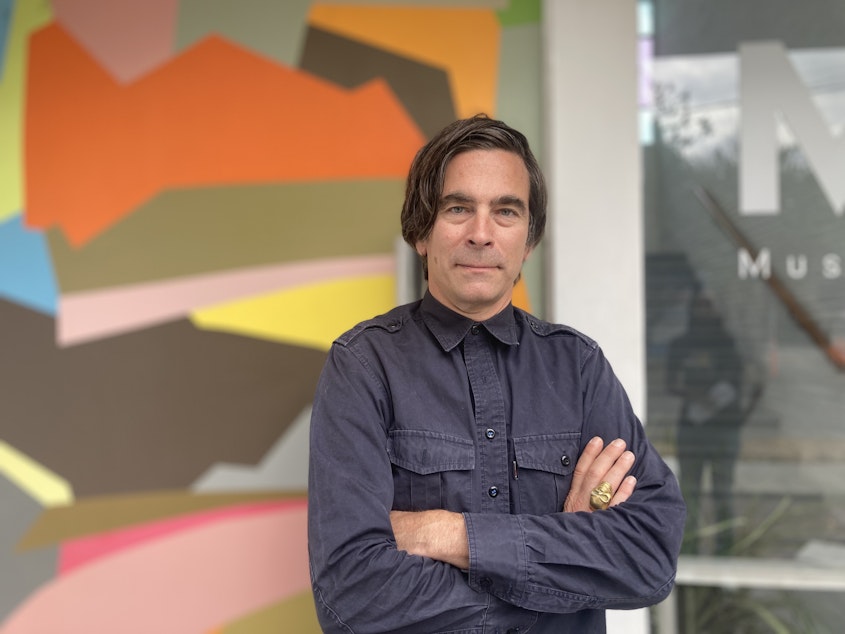Is Seattle's arts infrastructure crumbling?

The Museum of Museums opened during a global pandemic.
It was like a breath of fresh air — a chance to enter another world, filled with sculptures and paintings lit in neon light.
But now, three years after it first opened, the Museum of Museums is shutting down.
On Aug. 3, Museum of Museums founder Greg Lundgren announced it would be shutting down.
But the reason isn't a funding shortfall, or a lack of interest. It's bad pipes.
Sponsored
And that's got people asking: Who is responsible for sustaining the arts in our city?
RELATED: Seattle's Museum of Museums announces permanent closure
"Both of those run all the way up to our flat, top roof. And our flat, top roof, when it rains, sends all the water from the roof down through these two pipes," Lundgren explained.
And those pipes aren't just leaking — they're flooding the building.
"When it was raining, it comes up through all the floor drains," he added. "It gets to be an inch deep, two inches deep, three inches deep, to where we were pumping out hundreds of gallons of water an hour."
Sponsored
And this was not just rain water. The pipes are also connected to the sewer lines. "So it's a pretty nasty affair," Lundgren said.
The museum has put thousands of dollars into trying to fix it over the last two years. They’ve hired emergency plumbers, they’ve tried unblocking the pipe — they even cut up the museum’s concrete floor to install a camera to look at the pipe more closely.
But fixing the pipe would involve cutting open the sidewalk next to the museum, in addition to part of the street. But that street is Broadway, which is one of the busiest places on Capitol Hill. It's covered in street car rails and there are many pedestrians afoot. Busting up the street could also interfere with accessing local hospitals.
In other words, its a mess.
It's also, technically, not really Lundgren's mess.
Sponsored
"We had a five-year lease with Swedish with the understanding that we would be the last tenant of the building," he explained. Lundgren leases the property from Swedish Medical Center, which owns all the buildings on that block.
He also notes that the building was in terrible shape when that lease started: It took months to get the museum up to code before it could open.
But that wasn't a surprise. In fact, it's the reason Lundgren rented it to begin with.
"It just kind of seems like the pattern that I operate in, and that a lot of artists and arts organizations operate in, is that you pay below market rent for a space with the understanding that you're not given a lot, and it's a temporary arrangement."
Lundgren added that this is probably the fifth art space he's had in Seattle that he's been forced to leave.
Sponsored
One of those spaces was turned into the city's Office of Arts and Culture — a win in his book. But the others were torn down and redeveloped into high-end businesses or apartment buildings.
"I've always kind of hoped that — not only in the spaces that I've operated, but in a lot of my friends' spaces and other spaces that I respect — these are all proof of concepts," Lundgren said. "These are all like ways for us to show the public and show our community that they're viable."
Lundgren added that he hopes someone or some organization might see the work he and other artists are doing, and support it by buying the building to preserve it.
So far, that hasn't happened.
There's no one person to blame for the current state of arts infrastructure in Seattle, Lundgren said — it's everybody's responsibility to support the creative economy.
Sponsored
"It could come from city government, it could come from private philanthropy, it could come from tourism. There are a lot of different ways that that could come," he noted. "It's a matter of how people show up, who shows up. And I think that there has to be 10 different ways to win. There are 10 different ways to win."
Lundgren said he's still excited about Seattle, and believes it has the potential and resources to be the site of a cultural renaissance.
But that renaissance won't happen on its own.
"It requires intentionality. And I think it requires asking for it. And it requires pointing out to people that we're capable of that," he said. "I see what Seattle could become. And if I can help push it towards that destination, then that seems like a pretty good way to live."






